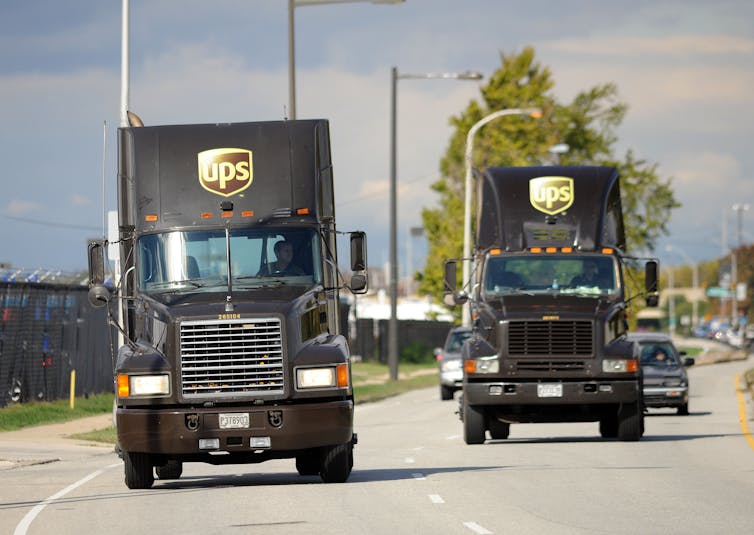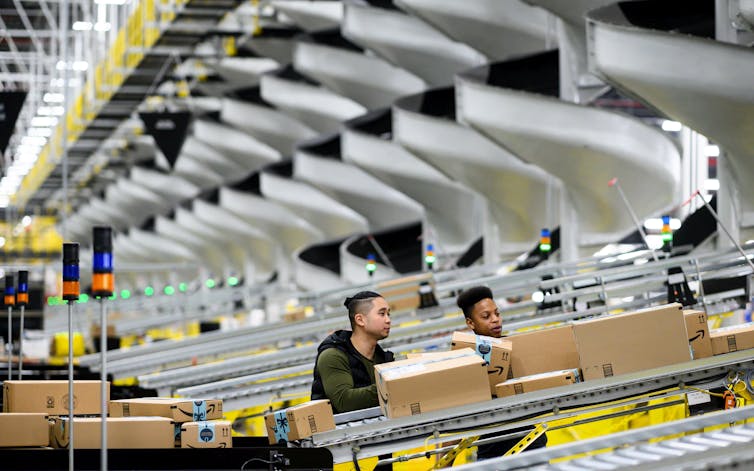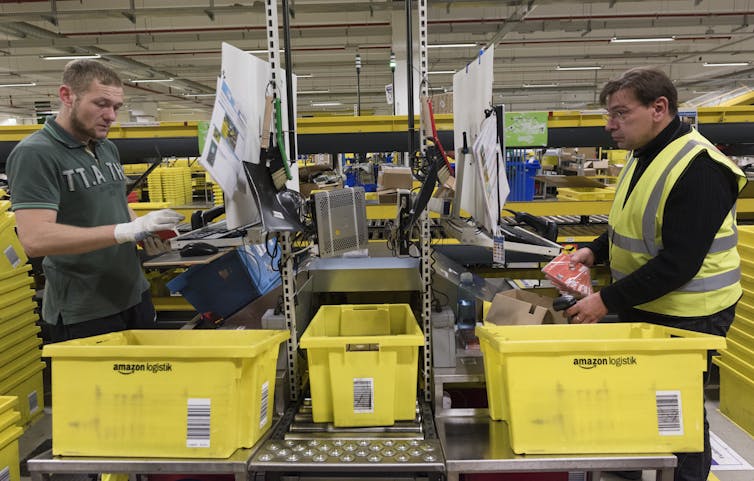
By Simone Peinkofer
E-commerce may make shopping more convenient, but it has a dark side that most consumers never see.
Say you order an electric toothbrush for Father’s Day and two shirts for yourself from Amazon. You unpack your order and discover that the electric toothbrush won’t charge and only one shirt fits you. So, you decide to return the unwanted shirt and the electric toothbrush.
Returns like this might seem simple, and often they’re free for the consumer. But managing those returns can get costly for retailers, so much so that many returned items are simply thrown out.
In 2022, returns cost retailers about US$816 billion in lost sales. That’s nearly as much as the U.S. spent on public schools and almost twice the cost of returns in 2020. The return process, with transportation and packaging, also generated about 24 million metric tons of planet-warming carbon dioxide emissions in 2022.
Together, costs and emissions create a sustainability problem for retailers and the planet.
As a supply chain management researcher, I follow developments in retail logistics. Let’s take a closer look inside the black box of product returns.
Returns start with miles of transportation
So, you repackaged your unwanted shirt and the electric toothbrush and drove them to UPS, which has an agreement with Amazon for free returns. Now what?
UPS transports those items to the retailer’s warehouses dedicated to processing returns. This step of the process costs the retailer money – 66% of the cost of a $50 item by one estimate – and emits carbon dioxide as trucks and planes carry items hundreds of miles. The plastic, paper or cardboard from the return package becomes waste.

William Thomas Cain/Getty Images
Processing a return takes two to three times longer than initially shipping the item – it has to be unpacked, inspected, repacked and rerouted. That adds more to the cost to the company, especially in a tight labor market. Workers have to manually unpack the items, inspect them and, based on the return reason, decide what will happen next.
Restocking and reselling means more miles
If a warehouse worker decides the shirt in our example can be resold, the shirt will be repackaged and sent to another warehouse.
Once another consumer orders the shirt, it will be ready to be packed and shipped.

Johannes Eisele/AFP via Getty Images
In-store returns can significantly cut warehouse and transportation costs, but driving to a brick-and-mortar store might not be convenient for the consumer. Only about a quarter of online purchases are returned in person to the store.
Refurbishing, if repair costs less than the product
If the item is defective, like the electric toothbrush in our example, the warehouse worker might send it back to the manufacturer for fixing and refurbishing. It would be repackaged and loaded on a truck and possibly a plane to be sent to the manufacturer, leading to more carbon dioxide emissions.
If the electric toothbrush can be repaired, the refurbished product is ready to be sold into the consumer market again – often at a lower price.
Refurbishing returned products helps to achieve a closed-loop supply chain where products are reused rather than disposed of as waste, making the process more sustainable than buying a new item.

Horacio Villalobos/Corbis via Getty Images
Sometimes, however, repairs cost more than the product can be resold for. When it is more expensive to restock or refurbish a product, it may be cheaper for the retailer to throw the item away.
Landfills are a common end for returns
If the company can’t resell the shirt or refurbish the electric toothbrush economically, the outlook for these items is grim. Some are sold in bulk to discount stores. Often, returned products simply end up in landfills, sometimes overseas.
In 2019, about 5 billion pounds of waste from returns were sent to landfills, according to an estimate by the return technology platform Optoro. By 2022, the estimated waste had nearly doubled to about 9.5 billion pounds.
Era of free returns might not last
In the past, customers who wanted to return items by mail were often expected to do so on their own dime. That changed after Amazon began offering free returns and providing easy-to-use drop-off locations at UPS or Kohl’s stores. Other retailers followed suit to compete, with many seeing free returns as a way to keep shoppers coming back.
But that pendulum may be starting to swing back. The percentage of retailers charging to ship returns increased from 33% to 41% in 2022.
Retailers are trying several other techniques to lower the return rate, waste and losses, which ultimately come back to consumers in the form of higher prices.
Some retailers have shortened the return window, limited frequented returns or stopped offering free returns. Other strategies include virtual dressing rooms and clearer fitting guides, which can help reduce clothing returns, as can high-quality photos and videos that reflect size and color accurately. If consumers use those tools and pay attention to sizing, they can help cut down on retail’s growing climate footprint.
![]()
Simone Peinkofer is Assistant Professor of Supply Chain Management at Michigan State University.





























Jimbo99 says
Don’t know which is more efficient really, if centralized warehousing & internet sales are, then that’s the model where the buck stops for lowest cost to retailers. There are 8 billion plus people that keeps growing, sometimes these sales returns & allowances are for whatever reasons they are for. Someone bought something online, then had buyer’s remorse. Anyone’s emails have to be spammed like mine are for sales that are fabricated to move predominantly made in China products. Quality has improved for Chinese products, otherwise USA corporations wouldn’t be buying the items, marking them up like they were made by more expensive labor. Guitars are just one example. When a lot of the electronics are made in Asia, it is what it is really. The landfills are getting filled up because those that dispose of what they or thier children have worn out or destroyed is not a retailer issue really, beyond being there with the next inventory of products to purchase as replacement. I’ve seen too many piles of landfill items, things like WalMart/Target bikes, appliances & furniture to know a lot of what is at the curb was a local WalMart or Target or they are etailers thru Amazon or eBay. End of the day there, the larger etailer corporations sell on both Amazon & eBay, even the smaller marketplaces. And it might surprise you how many local businesses are also selling online for Amazon & eBay, FB Marketplace & Reverb (musician’s gear). Nobody has a perfect solution to save the planet, not with 8+ billion & growing for population. What if you were the only one really saving the planet & everyone else was just lying about how “Green” & “Carbon Neutral” their operations really are ?
Carol Fisher says
We ordered, on Amazon, a replacement light fixture for our ceiling fan. They sent us 12! We let them know of the error and we were instructed to just dispose of the 11 we didn’t want. 11 light fixtures and all of the packaging went into a landfill.
Dave says
The price one pays ( retailer & consumer) for internet shopping. ITs only going to get worst, as walk in stores turn into, 2nd hand stores.